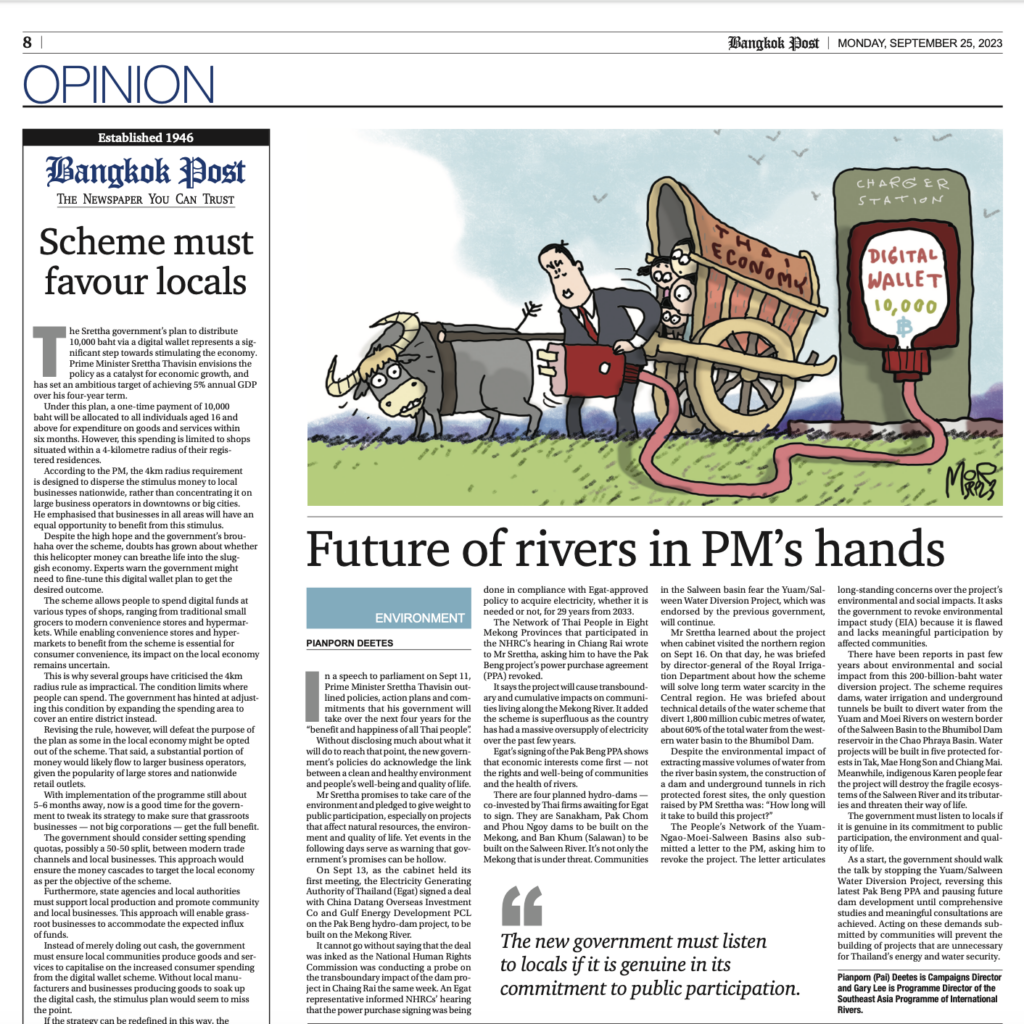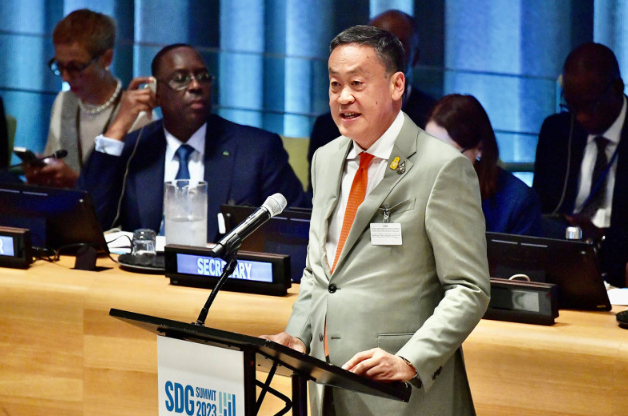Originally published in the Bangkok Post by Pai Deetes, “Future of rivers in PM’s hands”
In a speech to Parliament on 11 September, the new Thai Prime Minister, Srettha Thavisn, outlined policies, commitments and actions his government will take over the next four years for the “benefit and happiness of all Thai people.”
While limited in detail, the new government’s policies do acknowledge the link between a clean and healthy environment and people’s well-being and quality of life. As stated in PM Srettha’s speech, the government will take care of the environment, which is crucial to the country’s development and people’s health. Towards the end of his speech, Srettha also highlighted that the government places importance on public participation, especially on projects and operations that impact on natural resources, the environment, and quality of life.

Yet, events in the days following PM Srettha’s speech show just how hollow the new government’s promises are.
On 13 September, as the new Thai Cabinet had their first official meeting, the Electricity Generating Authority of Thailand (EGAT) signed a Power Purchase Agreement (PPA) for the controversial Pak Beng Dam on the Mekong River mainstream. Pak Beng’s major shareholders are China Datang Overseas Investment Co. Ltd and Gulf Energy Development PCL.
The PPA signing came to light towards the end of a hearing held by the National Human Rights Commission to investigate the transboundary impacts of Pak Beng Dam in Chiang Khong on 15 September. An EGAT representative informed the meeting that the Pak Beng PPA had been signed, committing EGAT to buy electricity, whether it is needed or not, for 29 years from 2033.
In response, the Network of Thai People in Eight Mekong Provinces, whose members also participated in the hearing, sent a letter to the Prime Minister, calling for the Pak Beng Dam PPA to be reviewed and canceled. The letter expressed concerns over the transboundary and cumulative impacts that the dam will have on communities living along the Mekong River and the lack of information provided to communities in Thailand upstream of the dam who would be impacted by the reservoir. The letter also draws attention to the fact that electricity from Pak Beng Dam is not needed, given the massive oversupply of electricity in Thailand over the past years.
The decision to sign the PPA, a key step in the development of the project, demonstrates how the economic interests of companies are being prioritized over the rights and well-being of communities and the health of rivers. Plans for four more dams on the Mekong – Sanakham, Pak Chom, Ban Khum (Salawan) and Phou Ngoy – all involve Thai companies who stand to benefit significantly from securing long-term PPAs with EGAT.
It’s not only the Mekong that is under threat. Communities in the Salween basin and concerned groups who are monitoring the Yuam/Salween Water Diversion Project fear the controversial project may see another concerted push under the new government.
During a site visit to Mae Kwang Dam on 16 September, PM Srettha learned about the Yuam/Salween Water Diversion Project from the Director-General of the Thai Royal Irrigation Department (RID), who presented it as a long-term solution for water scarcity in Chao Phraya Basin in Central Thailand. During the presentation, the RID director explained the project would divert 1,800 million cubic meters of water, approximately 60 percent of the total water that currently flows from Yuam River into the Salween River, to be stored in the Bhumibol Dam. Despite the serious consequences of extracting such a large volume of water away from the river system, the only question raised by PM Srettha was, ‘how long it would take to build the project?’
There is widespread opposition to the 200-billion Thai Baht water diversion project. Concerns have been raised about its potential impacts on the people and the environment and the economic feasibility of the project. The project involves diverting water from the Yuam and Moei Rivers in the Salween Basin to the Bhumibol Dam reservoir in the Chao Phraya Basin through the construction of a dam and tunnels. If built, the project would have major impacts, including on at least five protected forests in Tak, Mae Hong Son and Chiang Mai provinces. Local Indigenous Karen People fear the project will destroy the fragile ecosystems of the Salween River and its tributaries and threaten their way of life.
The Yuam/Salween Water Diversion Project has been and continues to be investigated by several Thai institutions. In December 2022, the Parliamentary Committee on Land, Natural Resources and Environment sent a letter to the then-Prime Minister and other actors calling for the project to be stopped. Echoing key community and civil society concerns about the deeply flawed Environmental Impact Assessment (EIA), the Parliamentary Committee letter also called for the EIA, approved in 2021, to be withdrawn. The project is also being investigated by the National Human Rights Commission and the Thai Ombudsman Office, following complaints by communities that would be impacted by the project.
After learning about PM Srettha’s visit on 16 September, the People’s Network of the Yuam-Ngao-Moei-Salween Basins sent a letter to the Prime Minister calling for the project and related projects (such as the transmission line) be revoked. The letter articulates long-standing concerns over the project’s environmental and social impacts and reiterates calls for the EIA to be revoked due to flaws in the scope and lack of meaningful participation of affected communities.
If PM Srettha and the new government are genuine in their commitment to public participation, the environment and quality of life, they must listen to the voices of communities whose lives, cultures, and identities are intertwined with the rivers, forests and lands they have managed for generations. Stopping the Yuam/Salween Water Diversion Project, reversing this latest Pak Beng PPA, and pausing future dam development until comprehensive studies and consultations can be done on our life-sustaining Mekong and Salween would be a great start. Acting on these demands submitted by the Mekong and Salween communities would prevent the building of projects that are unnecessary for Thailand’s energy and water security, and which will have major adverse impacts on rivers and people.
Featured photo credit: Prime Minister Srettha Thavisin, Bangkok Post

